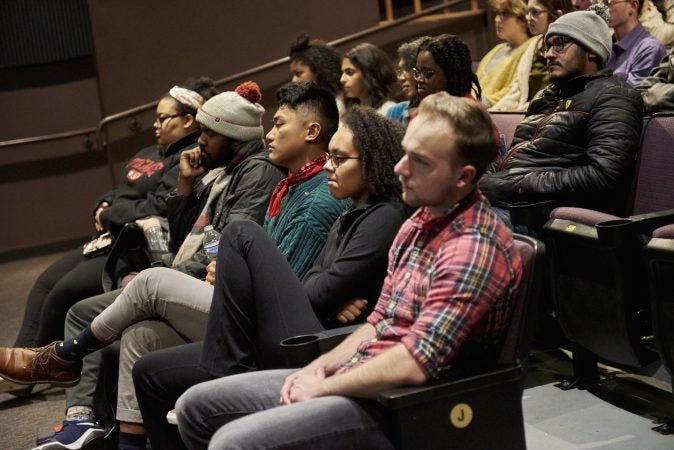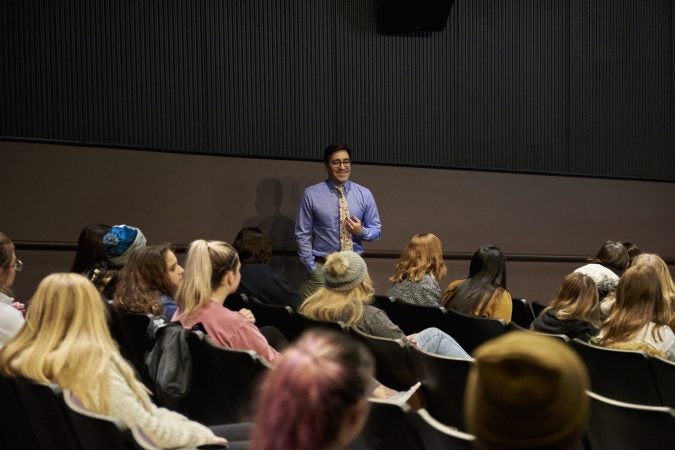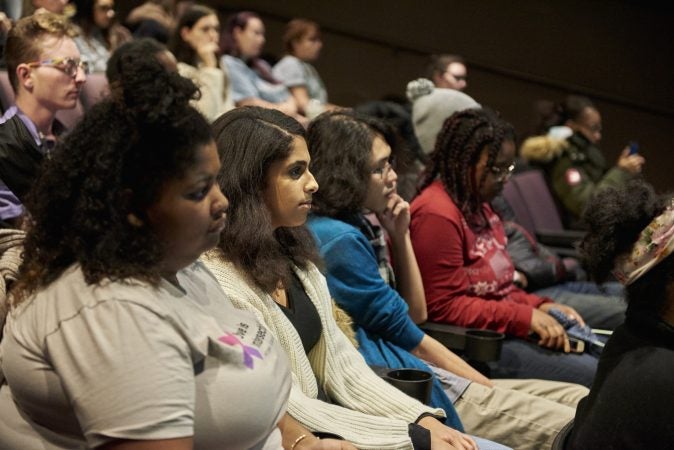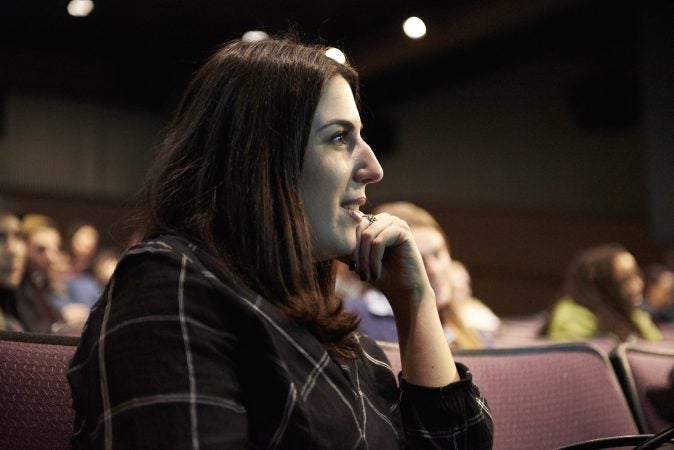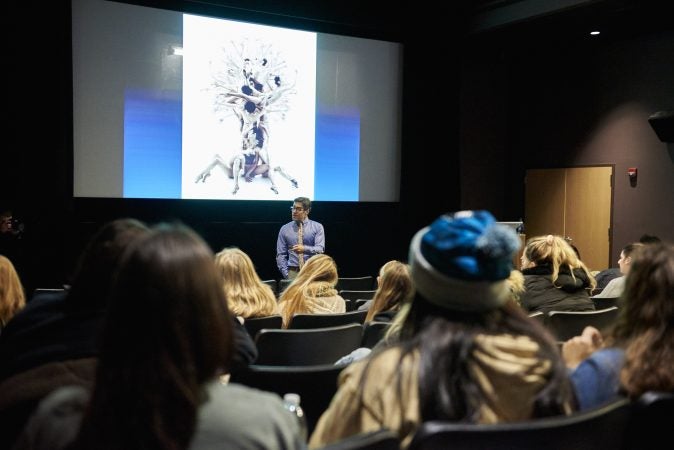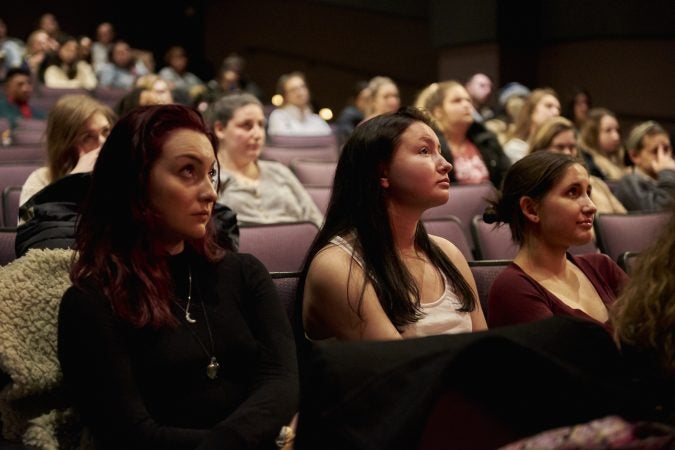Philly Greek organizations apply policies, intervention to confront campus sex assault
Temple and Penn have updated policies as fraternities and sororities participate in efforts to raise awareness. But is it enough?
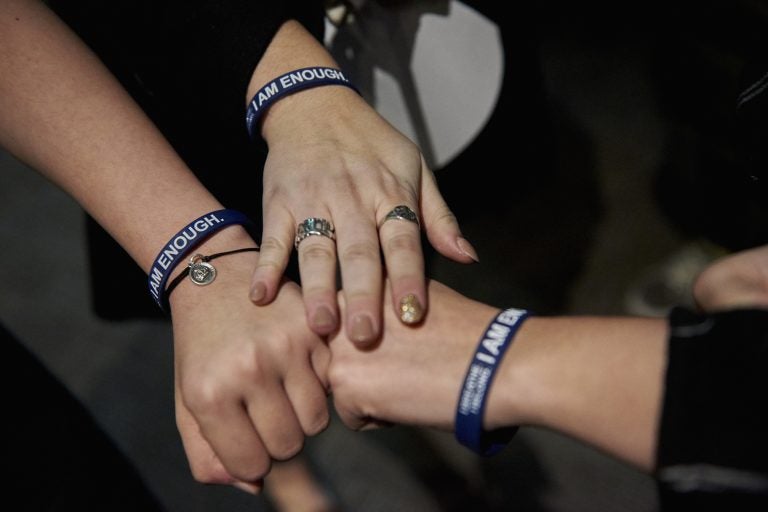
Students who attended Scott Fried's program wear bracelets given to them by Fried that read, "I am enough" (Natalie Piserchio for WHYY)
Alex Derbyshire was shocked when he heard in late March 2018 that Temple University was investigating Ari Goldstein.
At the time, there was gossip around campus about a sexual assault that allegedly took place at the Alpha Epsilon Pi fraternity house in North Philadelphia. Goldstein was the fraternity’s president.
“I remember being shocked at the scale of what was going on,” Derbyshire said. “After the shock, I was really angry. I remember thinking, ‘How could this go so long without Temple doing anything?’ ”
Derbyshire was the president of another fraternity on campus, Pi Lambda Phi, at the time.
He immediately called a mandatory meeting for all 65 of his fraternity brothers and condemned the alleged incident in an Instagram post.
“We would like to stress that Pi Lambda Phi has zero tolerance for sexual assault, misogyny, or racism of any kind,” Derbyshire wrote. He included contact information for student health services and Women Organized Against Rape. And he encouraged members of the Temple community who felt they had been victimized to speak out.
Temple suspended Alpha Epsilon Pi the following month. The university said it had received “multiple credible reports” of alleged crimes — including sexual assaults and underage drinking — at some of the fraternity’s events.
In May, prosecutors in Philadelphia charged Goldstein with trying to force a woman to perform oral sex on him during a party at the fraternity house in February.
Then in August, Goldstein was charged with rape and other offenses in connection with a second assault the previous fall.
Temple is one of many colleges and universities grappling with sexual violence on campus in general and at Greek organization events in particular.
These incidents have left Derbyshire and other leaders of some Greek organizations grappling with how to respond.
“The whole Greek life and sexual assault issue really gets to me,” Derbyshire said.
During the meeting with his fraternity brothers, Derbyshire said he stressed one of the organization’s core values — to always be a gentleman and to buck the stereotypes of drunken, rude, womanizing “frat boys.”
“Yes, it’s a stereotype, but it does happen, and it’s a place where things are more likely to happen,” he said. “I want to make sure that we’re not playing into that stereotype.”
Derbyshire also told his brothers about the experience of one of his female friends.
The young woman was dancing at a party when a man came up behind her and began groping her. She told Derbyshire later how the incident made her feel uncomfortable, and she froze in fear.
Since then, Derbyshire has started intervening — including escorting men out of parties — when he witnesses similar incidents at his fraternity’s events.
“Just seeing someone look uncomfortable is not something you want to see,” Derbyshire said. “I hate to see people feel like it’s their fault, and it’s so obvious that it’s not their fault.”
The fraternity decided to participate more in sexual violence awareness efforts on campus, including Temple’s chapter of “It’s On Us“, the campaign created under the Obama administration.

Two members of the fraternity are also on Temple’s sexual violence prevention committee, formed in October to create trainings and educational programs for the school community.
Other Greek organizations, including sororities, have followed suit.
To raise awareness of the high rates of assault on campus — one in five women and one in 16 men are sexually assaulted while in college, according to a 2015 statistic from the National Sexual Violence Resource Center — Temple sorority Alpha Epsilon Phi brought in motivational speaker Scott Fried to speak to students about consent and preventing sexual violence.
The sorority’s heritage chair, Maura Brody, said the goal, in part, was to “bring a good light to Greek life” by educating themselves, as well as the entire Temple community.
The organization has also hosted workshops focusing on sexual violence and healthy relationships.
However, Brody said, despite these new workshops and awareness efforts, she still feels protective of her sisters, and she makes sure they all stick together at parties to ensure their own safety.
Matt Greer, the program coordinator for fraternity and sorority life at Temple, says after the Goldstein allegations came to light, “our students became more hyper aware” of sexual violence on campus.
“It’s about making sure that Greek life is taking a stance against sexual violence,” he said. “I wanted to ensure that sorority and fraternity views will be heard.”
Colleges, universities take steps
Some college and university administrations are also taking steps to prevent sexual violence at Greek organization events.
In 2016, an activist group at the University of Pennsylvania posted hundreds of flyers around campus, featuring a suggestive email sent by an unaffiliated, off-campus fraternity known as OZ, inviting “ladies” to a party.
“May we have your attention please/We’re looking for the fun ones/And say f*ck off to a tease,” the email read.
The activist group’s flyers stamped over the words of the email with the messages: “This is what rape culture looks like” and “We are watching.”
Penn now requires any student who wants to join a fraternity to take at least one workshop on consent. The workshops are run by an organization called Men Against Rape and Sexual Assault or MARS.
James Hiebert, a senior at Penn, has been a member of MARS for two years. He joined after his friend was sexually assaulted, and he wasn’t sure how to handle the situation.
The trainings focus on “how men have learned how to talk about sex and relationships and what healthy relationships and sex looks like on campus,” Hiebert said.
“Students often talk about a hookup culture where people have sex freely,” he added. “People, particularly men, have a tendency to overemphasize how much sex they think other people are having. But I do think our culture here in which there can be an unhealthy consumption of alcohol and people working hard to play hard isn’t always a healthy combination.”
All events hosted on and off campus at Penn must be registered with the school, have university-approved bartenders and security. Kegs are banned.
Temple now requires all fraternity and sorority chapters to register all social events that involve alcohol and to give wristbands to students who are 21 and older.
‘There is change’
But have these new policies and efforts to raise awareness made a difference?
“In the world of sexual assault prevention, measuring effectiveness is hard,” Hiebert said. “There is change. Before, there was an emphasis on teaching the definition of consent. Research shows that doesn’t work alone, so we went with a more holistic approach.”
According to a 2016 report from the Centers for Disease Control and Prevention, social-emotional learning — an approach that focuses on open discussions and problem-solving techniques — is a more effective tool to prevent sexual violence.
“I feel that I’m part of something great,” Hiebert said. “There is always someone, one person, always in the room that needs to hear our message, and that makes a difference.”
While he says he can’t tell if these efforts are making a difference across campus, Alex Derbyshire said his fraternity at Temple has made some positive changes.
Derbyshire and his brothers frequently discuss how to be better bystanders.
“The general protocol is, if you see someone being creepy, approach both the girl and guy to make sure it’s OK,” Derbyshire said. “If not, split the two parties by escorting guys out.”
Now, when the fraternity does host parties, the brothers make sure to tell the DJ to stop the music and point out people acting out of line, so they can be escorted out.
“It’s more important for people to feel safe than us having a good time,” he said.
WHYY is your source for fact-based, in-depth journalism and information. As a nonprofit organization, we rely on financial support from readers like you. Please give today.



